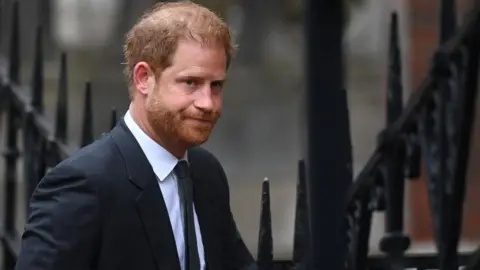Prince Harry loses battle to get Mail on Sunday libel defence thrown out
 EPA
EPAPrince Harry has lost an attempt to get part of the Mail on Sunday publisher's defence thrown out in a libel case.
The Duke of Sussex has taken Associated Newspapers Ltd (ANL) to the High Court over a 2022 article about a battle over his UK security arrangements.
The prince has said the story falsely suggested he had "lied" and "cynically" tried to manipulate public opinion.
But the judge said ANL's honest opinion defence had "a real prospect of success and should go forward to trial".
Friday's judgement comes in the same week that the duke made a separate High Court challenge against the Home Office over his security protection when visiting the UK.
His lawyers want to overturn a ruling that saw his security status downgraded after he stopped being a "working royal".
The libel case centres on an article that, according to the judge, claimed the prince tried to "mislead and confuse the public" over that dispute with the government.
The headline said the duke had "tried to keep his legal fight with the government over police bodyguards a secret", but that his "PR machine tried to put a positive spin on the dispute" after the story broke.
The duke has denied the suggestion that the he only offered to pay for his security after starting legal proceedings in 2021, saying he had made an offer at a meeting in Sandringham the previous year.
However, the Mail on Sunday say the Sandringham offer was not made to the government, and the duke only made an offer to the government after he had started his claim for a judicial review.
In his judgement on Friday, Mr Justice Nicklin said: "The Defendant [ANL] has a real prospect, at trial, of demonstrating that the Duke of Sussex had not made an offer to the Government to pay for his security before he began his proceedings for judicial review."
The publisher can use the honest opinion defence, which gives protection to individuals or organisations from being held liable for defamation in cases where statements are made as opinions rather than false statements of fact.
A trial is expected to be held in 2024.
